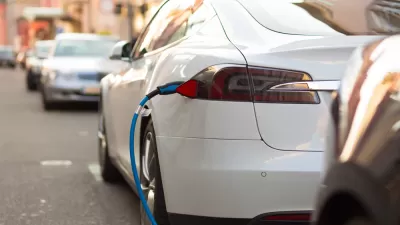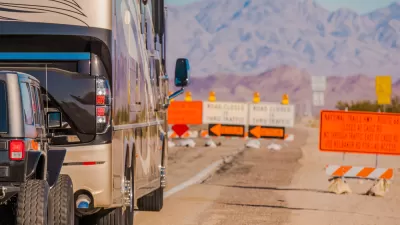The president spoke briefly about infrastructure in his third State of the Union address last Tuesday, urging Congress to pass the bipartisan America’s Transportation Infrastructure Act of 2019. Michigan Gov. Gretchen Whitmer had a lot more to say.

"During an address delivered on the eve of the final day of his Senate impeachment trial, the focus of the president’s infrastructure messaging was a five-year highway reauthorization measure that left key questions about long-term funding unanswered," reports Eugene Mulero for Transport Topics.
“We must also rebuild America’s infrastructure,” Trump said Feb. 4 before asking the lawmakers to pass Sen. John Barrasso’s highway bill to “invest in new roads, bridges and tunnels all across our land.”
Last year, Barrasso, a Wyoming Republican and chairman of the Environment and Public Works Committee, led the bipartisan passage of a measure meant to update the 2015 FAST Act highway law.
[See Planetizen: Climate Gets a Mention in First Committee's Approval of Federal Transportation Bill, Aug 1, 2019]
The FAST Act expires on Sept. 30 of this year, so there is some urgency to move the bill as fuel taxes will expire without the passage of either the full reauthorization or a short term extension, usually in the form of a few months, which would need to be funded. Without an increase in fuel taxes, the Mass Transit Account will be exhausted in 2021, with the Highway Account to follow in 2022, according to the Peter G. Peterson Foundation.
"While the Senate bill proposed $287 billion, a climate change plan and an aggressive streamlining of the environmental permitting process, it stopped short of addressing the Highway Trust Fund’s looming insolvency," adds Mulero. He also referenced the House Democrats' $760 billion infrastructure plan, proposed without funding, which "they said was dependent on the president’s input on highway funding."
Democrats' response
"In the Democrats’ formal response to the State of the Union, Michigan Gov. Gretchen Whitmer highlighted congressional Democrats’ recent big-picture infrastructure plan," adds Mulero. "She also noted legislatures in states such as Illinois and New Jersey, which opted to rehabilitate transportation corridors and multimodal facilities." ABC News has the 10+ minute video; Michigan Radio the transcript.
“All across the country, Democratic leaders are rebuilding bridges, fixing roads, expanding broadband and cleaning up drinking water. Everyone in this country benefits when we invest in infrastructure,” Whitmer said.
Why Whitmer?
"The choice highlights the central role Michigan and the industrial Midwest are expected to play in the presidential election this year," reported Rick Pluta of Michigan Radio (NPR affiliate).
House Speaker Nancy Pelosi and Senate Democratic Leader Chuck Schumer announced Whitmer will deliver the response and described her as a model to be emulated. Their statement praised Whitmer’s work for clean drinking water in the wake of the Flint water crisis.
Also, her still-unfulfilled campaign promise to “fix the damn roads” in a state where under-investment and freeze-and-thaw weather cycles wreak havoc on asphalt and concrete.
The reason for Whitmer's lack of progress on the campaign promise to fix roads is not at all uncommon—raising transportation funding is never easy, particularly when state government is divided. Whitmer has been pushing a 45-cents per gallon gas tax increase, while the Republicans, who control both chambers of the legislature, have resisted it.
See NPR's annotated transcript of Whitman's response for fact check, commentary, and analysis. In addition to infrastructure, Whitman addressed health care and education.
Related in Planetizen:
-
Democrats Reveal a $760 Billion Transportation Framework, January 30, 2020
FULL STORY: President Trump Calls On Congress to Advance Sen. Barrasso’s Highway Bill

Alabama: Trump Terminates Settlements for Black Communities Harmed By Raw Sewage
Trump deemed the landmark civil rights agreement “illegal DEI and environmental justice policy.”

Planetizen Federal Action Tracker
A weekly monitor of how Trump’s orders and actions are impacting planners and planning in America.

Why Should We Subsidize Public Transportation?
Many public transit agencies face financial stress due to rising costs, declining fare revenue, and declining subsidies. Transit advocates must provide a strong business case for increasing public transit funding.

Understanding Road Diets
An explainer from Momentum highlights the advantages of reducing vehicle lanes in favor of more bike, transit, and pedestrian infrastructure.

New California Law Regulates Warehouse Pollution
A new law tightens building and emissions regulations for large distribution warehouses to mitigate air pollution and traffic in surrounding communities.

Phoenix Announces Opening Date for Light Rail Extension
The South Central extension will connect South Phoenix to downtown and other major hubs starting on June 7.
Urban Design for Planners 1: Software Tools
This six-course series explores essential urban design concepts using open source software and equips planners with the tools they need to participate fully in the urban design process.
Planning for Universal Design
Learn the tools for implementing Universal Design in planning regulations.
Caltrans
Smith Gee Studio
Institute for Housing and Urban Development Studies (IHS)
City of Grandview
Harvard GSD Executive Education
Toledo-Lucas County Plan Commissions
Salt Lake City
NYU Wagner Graduate School of Public Service




























